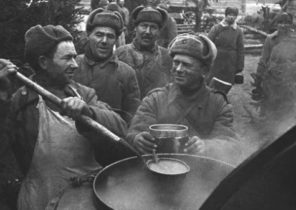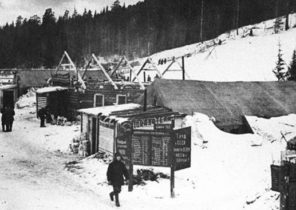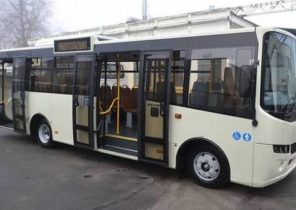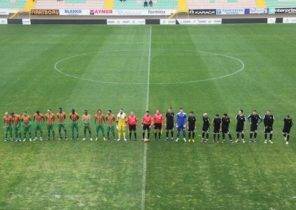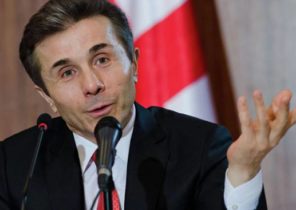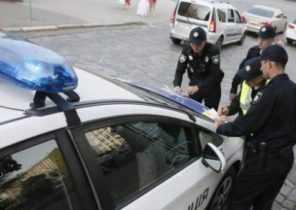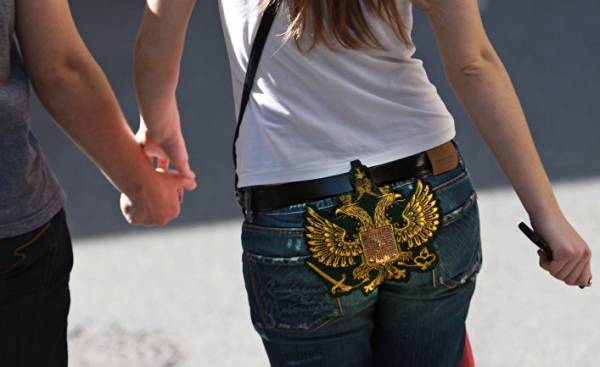
Translation carried out by the project Newочем
He didn’t know what to show me when we met at a hotel near the train station, so we just decided to walk along the dusty summer streets of Nizhny Tagil, a bustling industrial city located on the Eastern slope of the Ural mountains. His name is Sasha Makarevich, he is 24 and he works with cement. His blond hair gathered in a tail, and cropped denim vest sewn Confederate flag. When I asked him about the flag, he replied: “I thought it was just a sign of independence”.
We pass by a one-story, similar to the cube building. On its walls are depicted the Soviet red star and the orange and black St. George ribbon and military awards of the Empire, the Soviet Union and Russia. “We could go here — shrugs Sasha. But there’s plenty of survivors of the nineties”.
Sasha is also one of those who survived the nineties. In December 1991, a few months before his birth, the Soviet flag over the Kremlin was replaced by the Russian tricolor, marking the beginning of the decade, which has deposited in the minds of contemporary Russians. Bright expectations that soon the Russians will begin to live in the prosperous Western countries, are faced with a harsh reality: it takes a lot of effort and patience to transform a command economy into a market, to bring democracy to a country which for centuries dominated the monarchy and totalitarianism, and the work is very tedious and laborious.
I was not able to catch the nineties. My family moved from Moscow in April 1990. When I first returned in 2002, in the midst was the era of Vladimir Putin — the exact opposite of the chaos of the nineties. Since then I have often returned to Russia for several years she lived here and worked as a reporter.
Most Russians I know are in some way influenced by the 74-year Soviet experiment. Each of us deep down there is a small, sometimes sad, story of his own family — a large part of the tragedy of the time. But the current generation knows only Russia, crippled the nineties and after a tightly managed by Putin. This year is the twenty-fifth since the collapse of the Soviet Union, I returned to meet young people like Sasha. Who are they? What they want from life? What they want from Russia?
Inside the bar has no Windows, everything is covered with linoleum and is made from wood panels. Brought to us ordered a light beer in plastic cups, and we sat down to drink next to tattooed hot men in tracksuits and sandals, later, these men included piercing Russian pop music on their phones.
According to Sasha, Nizhny Tagil “is the factories and prison camps.” Once known for the production of trains, cars and tanks in the Soviet Union, the city now is famous for its abandoned factories, unemployment and Vladimir Putin. When in 2011 Putin announced his intention to run for a third presidential term, in Moscow and other cities held rallies. Basically among the protesters were young and educated people from the middle class, and that winter factory worker from Nizhny Tagil live on national television, Putin said that he and his “guys” are ready to come to Moscow to beat up the protesters. Putin expressed against this idea, but the city was perceived as the heart of Putinland.
Now in Nizhny Tagil, the new mayor, whom Putin sent to transform the city; local tycoon has built a luxury clinic, but life is still hard. Sasha went to study at the welder and worked in a factory, getting a good salary, while the fall in oil prices and Western sanctions over the invasion of Ukraine didn’t sink the economy. Sasha stopped paying. He spent a year looking for work before you get a seat on Boeing’s two hours away from the city. Now he gets 30 thousand rubles per month, which roughly coincides with the average wage in the region.
With Sasha, we met at the end of a long day, he was tired, hands stained with dirt. He was clearly not entirely comfortable — and safe — in this bar full of representatives of the dashing nineties. The town he describes as very conservative: “People here are aggressive to any who are different from them”. Sports suit and a haircut with a few bangs — uniform members of the working class in Nizhny Tagil. According to Sasha, many of his colleagues — the children of ex-convicts: “They don’t respect the law.” “A real man either in the army or in jail,” said my teacher in the sixth grade. So Alexander learned to fight: fists, knives. One day after a fight he came home in someone else’s blood, and suddenly blissfully fun telling me about it.
In fact, Sasha wants to run away to St. Petersburg and to open my own bar. He was there a couple of times and that’s where he feels most at home. But his girlfriend move in, only if he buys in St. Petersburg apartment. Given his and her salary is likely to dream of Sasha will remain only a dream.
For Nizhny Tagil this is a common story: young people and their typical youth dreams, which they cannot achieve due to the realities of Putin’s Russia. They want to travel, but their salaries in rubles, the value of which has halved since the economic crisis. Some want to start their own business but do not know how to overcome dangerous barriers of local corruption. And they learn to enjoy less. They want a house or an apartment, a car and a family. They want what they had just because their family has gone through the nineties.
“In financial terms, the nineties were very difficult for us,’ says Alexander Kuznetsov, 20-year-old resident of Nizhny Tagil. In 1998 my father left the family.” Alexander was three years old. “All my mom’s salary went to me to feed. Toys I had small. In the family I am one.” It left its mark. “For me the most important is family, says Alexander, when we drink coffee in a cafe near the main square. I don’t need a high post despite the fact that my house will be empty.”
His father fought in the First Chechen war, in 1994. “Don’t go into the army, my son,” he told Alexander. That was the General sense of his father’s memories of the nineties. But Alexander is not looking for ways to evade conscription. “I always wanted to serve, he explains. — Everyone in my family served. My great-grandfather fought in the great Patriotic war”. Plus, military service can help young people in Russia to get a better paying job: the police service, or FSB, the successor to the KGB. The army can give him a chance to become a police officer like my father. “I really wish I had a stable income,” — says Alexander.
During our Alexander of the conversation we are joined by his friend Stephen, a pound smiling guy with blond hair, shorn under the hedgehog. With a mischievous smile he asks me: “What, write what life was like in the Soviet Union? Then people live better”.
“What?! — exclaims Alexander. — Better live?! Nothing better!”
They argue about how hard it was to live in the Soviet era, while Stephen, born in 1992, realizes that he has a question to me: “You Americans, everything push us, hit us with sanctions. What are you, a war with us?” He explains why Russia did the right thing by annexing Crimea, and Putin is opposing the West.
Stepan doesn’t want to tell me his name, because I’m an American journalist, but when it’s time to leave, he offers me a ride. “But actually, he was nowhere when we ride, I wanna get out of here”.
I am interested in how. From Nizhny Tagil?
“No. From Russia.”
After his Patriotic fuse to hear it unexpectedly. I’m asking why.
“There’s nothing to do — without any anger, he says. There were no opportunities, ways to grow, to develop, to be somebody in life.”
I asked what his backup plan.
“My backup plan?— he asks with a wide smile. — To go to work in FSB”.
“Born in the USSR and after its collapse a completely different experience, — writes Svetlana Alexievich, laureate of the Nobel prize for literature 2015. — They were from different planets.”
The Soviet Union was drowned in the surge of optimism. Many believe that Russia is rapidly becoming a prosperous Western democracy. But the optimism of 1991 disappeared in the decade of often frustrating contradictions. With the end of the planned economy for someone, the time has come untold wealth or entering into a new middle class; others are faced with sudden poverty. Previously unavailable products flooded store shelves, but the money to buy them from time to time lose their value. Crime, especially in trade, has grown significantly. The policy was released to the public, but many Russians began to perceive it as a dirty business.
Russia had difficulty adjusting to an alien reality. It was a time of unprecedented freedom, but for many it has caused great confusion. “When these [Western] values faced with the reality, and people saw that change was happening too slowly, values left on the back burner, says Natalie Sharp, a sociologist at the Levada center, an independent Moscow polling organization. — Instead, the younger generation takes over “value pillars of the Soviet society”.
Sasha, Alexander, Stephen and like them guys really do not live on the same planet that their parents, grandparents, but in some moments they become even more Soviet. Strange thing: these young men and women know little about the hardships, customs and cruelty of life in the USSR. Putin’s generation has no wound. Their need for a quiet normal life — a stable family, reliable, albeit unloved, work — a reaction to something that they lacked in the nineties and what they have gained in the Putin era.
And yet they are amazingly vulnerable. 65% of Russians aged 18 to 24, that is, the first generation born after the Soviet collapse, according to the Levada center, plans life is not more than a year or two ahead. “This is a very self-centered generation, says Keen, but adds, — and very fragile.” They are also politically inert: most do not know about news events that are not wished to highlight the state itself, and 83% say they did not participate in any political or civic activity.
Lisa meets me in the sparkling white lobby of one of the glass towers of the blue spirals and copper-red fragments of which consists of Moscow-city, the financial center, like a mixture of London and Shanghai. I go through the tunnels connecting the tower under the ground with cafes, shops and exhibition of portraits of Putin and foreign Minister Sergey Lavrov. We order lunch, and Lisa, a stylish girl with long blonde curls, dimples and expensive watches, talking about himself, gobbling up the soup. She asks me not to reveal her name because she didn’t want to disappoint parents.
She was born in Blagoveshchensk, in the Russian far East in 1992. A year earlier her father, a history teacher, joyfully celebrate the flowering of democracy on the streets of Moscow. But after returning home after the collapse of the Soviet Union, was forced to seek new ways to feed the family. He began to go to China and bring back everything from clothing to household appliances to resell it in Russia. “I remember he came home with money sewn into his shirt to avoid being robbed,” says Lisa.
Lisa is a corporate lawyer in a major Western firm. Work is good, but she wanted to do something else. “I always wanted to be a journalist; I always wrote something,” she says, adding that grandma kept all her stories. “But my parents told me that journalism is not serious. Is the sales profession — a legacy of the nineties, when journalism is bought and sold, like any product, you will not earn much. You are the eldest and the smartest, you need a decent profession to feed themselves and take care of sister.” Then her parents split up. Her father’s business eventually took off and Lisa was able to spend a year in school in Oregon, and then to go to London.
Lisa, the modern Western woman. She tells her mom about young people and about how go to parties where many people use drugs. But in some ways she’s very, very Russian. “Putin annoys me, she begins, as many in opposition of the Moscow environment, but just let them try a foreigner to criticize him! I will always defend Russia.” When she was in London, she said, over Russia and Russian women are constantly mocked — they were “brides to order.” “It was insulting to tears to sit there and listen to others laugh at us,” she says.
Now it is high policy that she can afford. In 2011, Lisa became interested in liberalism, which then in Moscow were very fashionable. She joined Amnesty International and the liberal party Yabloko as an observer at the December parliamentary elections. She was sent to the polling station at the school her younger sisters, and she was in shock when I saw how the teachers stuffing the ballot boxes. When Lisa tried to say something about it, those sort of screamed at her and made to sit in the corner, and the Director was blocking her view. This happened across the country. Many observers recorded this on a phone and posted entries to the network that became an occasion to mass protests in Moscow and other large cities, the largest in 20 years.
But Lisa could not resist. “I was in hysterics. I cried for two hours,” she says. Then she decided: “no More politics. Never. It does not concern me, and I’m not strong enough to fight”. That’s a promise it has not violated, even when the ruble collapsed, preventing her other favorite pastime: travel. “Yes, it’s horrible, features are now smaller, she says, but to search for answers in politics, refuses. Is a psychological block.”
Ksenia obidina, a friend of Lisa’s at the University, adheres to the same positions. She is also a child of divorce, and according to her the family and stability for her is the most important. She wants a stable and well-paid job. She wants to be able to travel and help his sister and mother. This dream, however, became more distant because of the political and economic crisis: Xenia wants to work in foreign law firms, but they are in greater numbers are leaving the country. Like Lisa, she doesn’t want to talk about politics. “I see no reason to talk about what can not influence. Talk for talk is uninteresting,” she says to me in a Moscow Starbucks. When we leave, she adds: “it is Better to know and be silent. It is better not to talk about it. Why spoil your mood?”
How come? The answer to this question is largely due to Vladimir Putin. He came to power in 2000 and built its political agenda on the criticism of the situation in the country in the 1990s. at this time the population began to take interest in events outside the country. He promised to lead Russia to prosperity and to ensure safety. Thanks to record-high oil prices and efficiency initiated in the 90s the economic reforms, he managed to keep a significant part of its promises, however, this result was achieved at the cost of constant violations of democratic freedoms.
The stability and economic prosperity have become fundamental components of modern Russian ideology, seasoned with nostalgia for the USSR, which now said goodbye to all errors. Putin called the collapse of the Soviet Union “the greatest geopolitical catastrophe” of the twentieth century. People who think otherwise, he said, “heartless.” Tending to borrowing terms from the business of modern rhetoric turned Joseph Stalin “an effective Manager”, which is a bit overzealous in the performance of their duties. School books and TV gradually began to project this view of events — a state-approved nostalgia. To date, 58% of Russians favor restoration of the Soviet Union, and about 40% favorable view of Stalin.
Much of the history of the country after the collapse of the USSR represents an unsuccessful attempt to find a unifying national idea. First she was supposed to be a democracy; then in place of the “Westernization” came the ideology of consumer society. “Consumption leads to the realization of the need of modernization, but this is not enough,” says sociologist Watchful. IKEA opened its first store in Russia in 2000 and quickly gained popularity among the new middle class because it is at an affordable price provides the ability to create the illusion of a stylish European — that is, not Soviet — life. “IKEA has become a symbol of how to make their lives more civilized and not go broke in the process, she explains. — However, the Russians somehow ignore the fact that behind all this decor hides a completely different approach to life and other values.”
From the beginning of his third presidential term in 2012, Putin supports the even more aggressive neo-Soviet ideology in the country and abroad. He did everything possible to preserve the Russian sphere of influence in these former Soviet republics like Ukraine and Kazakhstan, and demonstrated Russia’s military might in the distant Syria. Adopted a number of new laws aimed at strengthening traditional values and the suppression of any dissent. One result of such policies was the emergence of a generation whose dreams are the embodiment of all that he had planned for them Putin: conformism, materialism and risk aversion at any cost.
One of the favorite topics of the press — the incredible popularity of Putin among the people: at the time of delivery of this material a rating of popularity of the Russian President was 80%. However, the Russians aged 18 to 24 are the most ardent fans of: 88% of young people approve of Putin’s activities. They are much more than any other age group, are proud of their country and its position in the world, believe that Russian military power is a measure of its greatness, and believe in the future of Russia.
In one of the dark narrow alleys of Novosibirsk, sandwiched between two brick houses of the 19th-century building, I meet representatives of the local Bohemians, sipping beer and listening to electronic music. In this place the 22-year-old Philip screamers opened an art gallery. After leaving his company, he makes me a little tour around the room. One of the rooms lit by fluorescent pink light; wall hung shelves, hammered, miniature busts of Lenin, painted in crazy patterns. In the next room young artists organized the exhibition crazy ways to make selfe: for example, stick your head in a cardboard box filled with shards of mirror. In another of the same box — the scraps of the “Burger king”.
One of the friends and partners of Philip in the gallery suddenly jumps up and shakes my hand. “We just found out that they were buried under this building,” with the enthusiasm it produces. After Philip had rented this room, he and his friends found that in an adjacent room houses the local branch of the FSB. In the 1930s the security service was called NKVD and the hands of its employees were killed at least 1.2 million people. Often the victims of the NKVD shot and buried right at the place of sentence enforcement. However, the Philip’s gallery “contemporary art Space” was lucky. In the basement of the building there are no bones. Alone hipsters, stuffed there in the cool of Siberian nights.
Earlier that day I saw Philip in one of the posh cafes of Novosibirsk, surrounded by incredibly fashionable young women with undoubtedly pumped up lips. Novosibirsk is the third largest city in Russia, center of science and industry, where a lot of money. However, about Philip this is not true. He grew up without a father. Like many young Russians, he was raised by his mother and grandmother. His great-grandfather fought in World war II, and after he was declared an enemy of the people. His grandmother was a brilliant chemist, mother also found his calling in science. However, they have both always been active citizenship. “Politics is the main topic of conversation in our family,” says Philip.
Philip was 16, when Moscow was overflowed by organized Pro-democracy protests spreading to other major cities like Novosibirsk. Tens of thousands of people took to the streets with demands of free and fair elections, but the rally was more like a regional party, not a real demonstration. Philip, too, could no longer tolerate Putin. “People tried to convey to him their dissatisfaction, but the government did not go on contact,” says Philip. He was not know Russia which showed the state-controlled TV. “They showed some other country,” he recalls. “I was not acquainted with any man like the characters in the news.”
“I went to the demonstration. Tried to be a politically active citizen,” Philip tells me. “I had enough. I couldn’t think of anything else. The whole country is protesting, and I’m part of this protest.” Soon, however, he was disappointed. “I looked, and it turned out that the people at the demonstrations was strange to me. I felt no unity with them,” he explains. “And all this does not lead to anything”.
He, however, is not quite right. The protests still have changed the situation — just not in the direction of improvement. In may 2012, the Kremlin began to tighten the screws. Since then, dozens of people participated in the demonstrations were arrested, subjected to trial and sentenced to prison. The political situation in the country only deteriorated when Putin is feeling the betrayal of the middle class, which, he believed, appeared solely due to his merits — more and more tightened its course. He publicly called liberals who fought for freedom and democracy, “national traitors” and “fifth column”.
Such a rigid response is deeply impressed by “Putin” generation: they understood what the policy is better to stay away. “I decided that I have two options: either to fight against this system, in another system,” in the world of art. “And in the art world I’m better,” he says. “Policy is very annoying. You’re constantly dissatisfied with something, can’t enjoy my life.”
Putin will again run for President in 2018. There is little doubt that he will do so and in this case, it will surely win, securing 6 more years in power. Thus, he will remain President of Russia through 2024, if not longer. However, by that time Philip, who was 5 years old when Putin came to power, turns 29. As he prospect so many years to live under Putin? He shrugs his shoulders. “I lived all my life with my right hand, and it is quite comfortable.”
In Akademgorodok, a small village for scientists working at the Novosibirsk State University and its many laboratories, I became acquainted with Alexandra Mikhailova. She’s 20, she’s wearing short denim shorts and dye your hair red punk style. Alexander from a family of scientists: her mother is a geologist, and his father a physicist. At the time they moved to this small town, founded in 1957 as a special area for research and an Outpost of the Soviet Union in the technological race with the West. After the collapse of the Soviet Union is practically deprived of state financing, Russian scientists have significantly lagged behind their Western counterparts. Both parents of Alexandra changed profession and started his business.
Now, being a third year student of journalism, she is working on a documentary project about the campus and its lively intellectual history, in particular about the underground of the 60-ies. “Until 1966 there existed a municipal system of self-government”, — says Alexander, as we stand in the brightly lit hallway of the new University building. Her eyes light up when she talks about his study of this area of freedom and intellectual ferment in a sea of totalitarianism. In 1966, a few carefree young scientists wrote a letter to Moscow about the things that they did not like. According to Alexander, the response was immediate. Many got fired and was installed tight political control. But then Alexandra’s project talks about the 80-ies, when widely spread Soviet underground punk rock.
Alexander speaks about the present: “It’s stagnant. Something is missing. People involved in political life. When it comes to the government, youth are either indifferent, or refers to the whole favorably. No one is fighting for their opinion, and between indifference and acceptance of established fine line”.
The government is again engaged in censorship. The concert of the famous rock singer-songwriter 90s years (we are talking about Andrei Makarevich — approx. Newочем) was canceled because he spoke out against invasion of Ukraine. “Each year thereafter close the most objective media,” explains Alexander. But most of all upsets her that in your home campus is not enough fuse sixties and eighties. Cautious and stagnant society that surrounds it, is different from the one in which her parents lived. She wants change, shake-up, but realizes that to wait it is necessary not from her generation, from teenagers who are now 13-15 years. When they are her age, her generation will have other priorities.
“We will try to help, but when you’re 30 years old, you cannot be a leader of the revolution with a baby” — with slight envy says Alexander.

